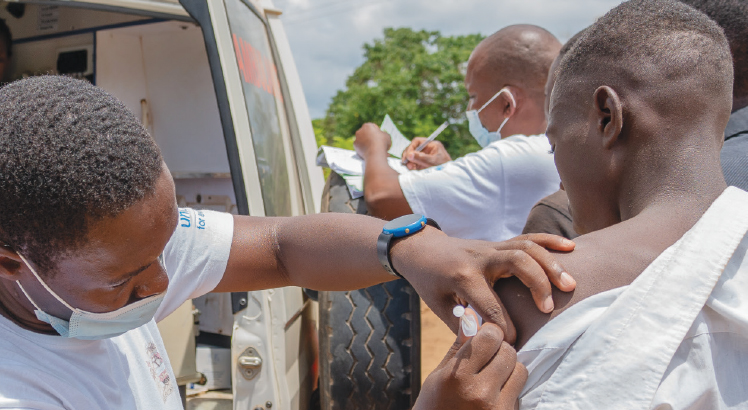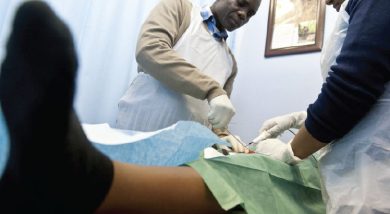Push for 70% Covid jab target
Malawi faces a tough task as it aspires to vaccinate 70 percent of its population with the Covid-19 vaccines by December 2023.
This is a target set by the World Health Organisation (WHO), which recently declared that Covid-19 no longer constitutes a public health emergency.

The declaration followed a meeting by the Emergency Committee on Covid-19 which met for the 15th time on May 4 2023 and subsequently issued a statement on May 5 2023, indicating that it is time to transition into long-term management of Covid-19.
This means Covid-19 is an established and ongoing health issue; hence, no longer a public health emergency threat.
But regardless of the declaration, Malawi’s 70 percent target on vaccination, just like other countries within the Southern Africa Development Community (Sadc), still stands.
With Malawi in a race to reach the 70 percent target, non-State actors are implementing numerous initiatives to push up the vaccination figures, currently at 39.77 percent as at May 2023.
For instance, since October 2022, the Malawi Red Cross Society (MRCS) together with Amref Health Africa have been mobilising communities in cities of Blantyre, Lilongwe and Mzuzu to be vaccinated against Covid-19.
The two organisations are embarking on this drive through a Saving Lives and Livelihoods Project, with each organisation playing a specific role.
MRCS is helping mobilise the communities while Amref Health Africa volunteers are conducting the vaccinations through a door-to-door approach and formation of static vaccination centres.
The project is being implemented with support from the Africa Centre for Disease Control (CDC) in partnership with Mastercard Foundation through the Botswana Red Cross Society.
Through the project, Mbayani Township resident Mefort Rex Gundamtengo says he was motivated to get vaccinated, including taking four jabs of the Covid-19 booster.
The local businessperson says he believes that despite a dwindling trend of Covid-19 reported cases, he still needs protection from the pandemic which scientists still fear that it might keep regenerating.
Says Gundamtengo: “I made a point that I should get vaccinated regardless of the fact that the reported Covid-19 cases were dropping and we reached a point which feels like we no longer have the pandemic among us.
“I was even more motivated to go for the booster shots four times and I am doing all this for my own protection. We never know what might happen next, so I just have to protect myself.”
Gundamtengo says he decided to ignore myths and misconceptions that have been associated with the Covid-19 vaccines for his own benefit.
Some of the myths and misconceptions that have been associated with the Covid-19 vaccines are that they make a person become barren and that it is the mark of the beast as explained in the Holy Bible’s Book of Revelations.
But looking at the Covid-19 deaths globally, Gundamtengo says he ignored all the myths and misconceptions to protect his life.
“After doing my own research I found out that most of those myths and misconceptions are just misleading.
“The myths have also been one of the major challenges that has compelled a majority of people not to get vaccinated,” he says.
Gundamtengo says while he personally decided to be constantly getting the Covid-19 booster jab, he was encouraged by volunteers working under the Saving Lives and Livelihoods Project.
“Their explanations compelled me to get the third and fourth booster jab and I have never had any side effects contrary to what people say,” he says.
Gundamtengo says people must overcome their fears and allay any myths and misconceptions associated with the Covid-19 vaccines and get vaccinated.
He says people must learn to take advice from the relevant authorities and officials instead of believing what is discussed on social media.
Similarly, Tinenenji Loveness Nungu from the same township was also convinced to take her first jab in June 2023 by the Amref Health Africa volunteers and MRCS officials.
She says: “They explained to me why it is important for me to get vaccinated because in the past I never wanted to get vaccinated due to what I used to hear.
“Now, after they explained to me the success stories of the Covid-19 vaccines, I decided that it is better that I should protect myself.”
Nungu says since getting vaccinated, she has never experienced any side effects or had any health complications.
She believes that despite that Covid-19 cases have dwindled, she will be protected especially in the scenario that there is a resurgence due to emerging variants.
Recent Covid-19 waves have been driven by numerous variants which public health experts say will keep emerging.
Epidemiology and public health professor at Kamuzu University of Health Sciences Adamson Muula says it is imperative that those with underlying health problems get vaccinated.
This, he says, is the best way to ensure they are protected in case emerging variants drive waves as observed in the previous scenarios.
In view of this, Nungu says she is confident that she will be able to not only protect herself, but her seven-year-old son and one-year old daughter, respectively.
Malawi’s low uptake of the Covid-19 vaccines have in various studies largely been attributed to myths and misconceptions that have been spread mainly using social media platforms.
For instance, a study led by Malawi University of Business and Applied Sciences (Mubas) senior lecturer Dr. Peter Muhagama established that some people believed Covid-19 was not real while others believed that it was satanic.
MRCS district coordinator (Blantyre) Malumbo Nyirenda says one of the success stories of the project so far is the allaying of perceptions as well as myths and misconceptions associated with the Covid-19 vaccines.
She says this is why more people are turning up for the vaccination despite that no more Covid-19 cases are being reported and the WHO declaring that the pandemic is no longer a public health emergency.
“The volunteers in this project are also disseminating information on myths and misconceptions which is convincing people to still be getting vaccinated.
“They are telling case studies which have proved as success stories as regards the Covid-19 vaccines,” she says.
But Muula says the implication of vaccinating less people is yet to be known.
He says if the country had experienced the worst outbreaks and high death rates, the low vaccine uptake would have been an issue.
Muula says: “As things stand, it is impossible to estimate the benefits of the vaccines at the population level.
“At individual level, those with asthma, heart diseases, diabetes and above 50 should ensure they are fully vaccinated.
“It would be unwise for these people to think what is going on in the rest of the community also applies to them.”
While stressing that little can be done to reverse the trend, Muula blames low vaccine uptake on misinformation and disinformation.
In its October 2022 report on Covid-19 vaccination in Africa, the WHO stated that as long as Africa lags behind the rest of the world in reaching widespread protection, a dangerous gap still exists which the virus can exploit and roar back with vengeance.
The report further stressed that priority should, therefore, be to shield the most vulnerable populations from the worst effects of the pandemic.
President Lazarus Chakwera and Vice-President Saulos Chilima jointly launched the Covid-19 vaccine exercise on March 11 2021 in Zomba and Mzuzu, respectively.
This was after Malawi had reported the first Covid-19 case on April 1 2020. But prior to that, the Malawi Government on March 23 2020 closed public schools to avert potential spread of the pandemic.
And in the advent of Covid-19 vaccines, scientists have recommended their use on the basis that they are an effective remedy in dealing with the pandemic.
This is apart from prevention measures that include washing hands with soap, putting on face masks and keeping social distance. n





